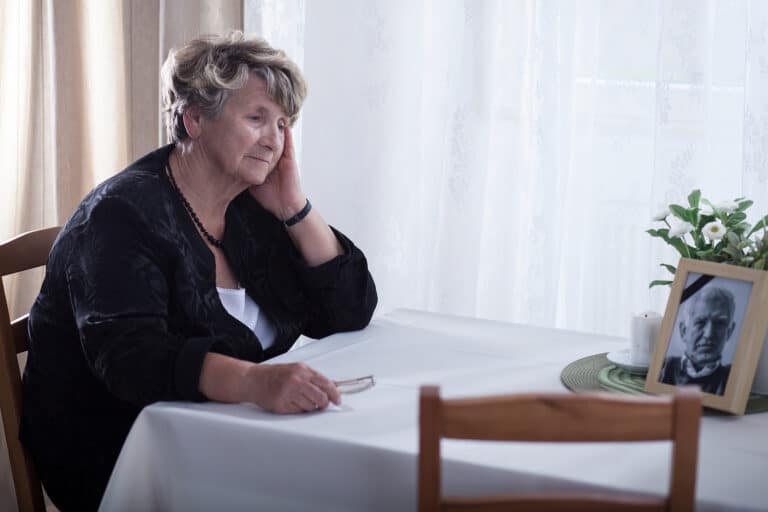Losing a spouse is an emotionally challenging experience for anyone, and it can be especially difficult for seniors who may have spent decades building a life together. When your senior parent loses their spouse they may go through a challenging time emotionally.
Companion Care at Home
After the death of a spouse, seniors often require particular support and assistance to help them cope with the loss and navigate through this difficult time. If your senior parent wants to continue living independently, they will likely need companion care at home and other types of support.
Lots of Emotional Support
One of the most critical needs for a grieving senior is emotional support. Losing a life partner can leave them feeling lonely, isolated, and overwhelmed with grief. Family members, friends, and support groups can play a crucial role in providing comfort and understanding during this time. Listening and offering a shoulder to lean on can make a significant difference in helping the senior cope with their emotions.
Companion Care at Home
Grieving seniors may experience profound feelings of loneliness and emptiness after the death of their spouse, especially if they were each other’s primary companions for many years. Providing regular companionship can help alleviate their feelings of isolation. Family members and friends can visit frequently, engage in activities together, or consider encouraging the senior to join social groups or clubs where they can meet new people and build new connections.
Help With Daily Life Tasks
The death of a spouse can leave the surviving senior with various practical challenges, especially if their late partner handled certain aspects of daily life. Offering practical assistance, such as help with grocery shopping, meal preparation, household chores, and managing finances, can be immensely helpful during this transitional period. Home care can also help with daily living tasks.
Professional Counseling
Grieving is a complex process. Professional counseling may help. Some seniors may find it beneficial to seek professional grief counseling or therapy to navigate their emotions effectively. Grief counselors can provide a safe space for seniors to express their feelings, address unresolved issues, and develop coping strategies for moving forward.
Help With Financial and Legal Matters
The loss of a spouse may necessitate legal and estate-related matters that the surviving senior may find challenging to handle alone. It is essential to offer support in dealing with these matters This may include seeking the assistance of an attorney to update wills and other legal documents, handling insurance claims, or transferring assets appropriately.
Help With Hygiene Tasks
During the grieving process, seniors may forget to take care of themselves physically and emotionally. Encourage them to prioritize self-care by maintaining a balanced diet, getting enough rest, and engaging in activities they enjoy.
Let Them Grieve in Their Own Way
Grieving is a personal journey, and each individual copes with loss differently. Be patient and understanding, allowing them to grieve in their way and at their own pace.
Keep Up a Daily Routine
Keeping some familiar routines can offer a sense of stability and comfort to the grieving senior. Simple activities, like going for a daily walk or participating in hobbies, can provide a sense of normalcy.
Offer Whatever Assistance They Need
If your senior parent’s late spouse was the primary driver, they may face transportation challenges. Offering transportation assistance or helping them explore alternative transportation options can be helpful.
Encourage Them to Talk About and Remember Their Spouse
Encouraging your senior parent to share memories of their late spouse and celebrate the life they had together can be a therapeutic way to process the loss and cherish the memories.
Amelia Home Care provides traditional in-home care services, along with virtual caregiving and Companion Care at Home. Our service area includes Brooklyn, Bronx, Manhattan, Queens, Staten Island, Yonkers, and Westchester County. Call today at (929) 333-3955.
We proudly provide non-medical home care services to individuals with disabilities, injuries, difficulties with mobility, or illnesses. Our team is composed of highly trained and competent staff members who are dedicated and experts in delivering home care services in the comfort of our client’s home.
Through our personalized care plan, we can give you the needed care services that are all intended to cater to your unique personal and health needs. With us, we ensure around-the-clock services and supervision to help you achieve optimum health and wellness.
- Exploring Dental Emergencies: Support and Care Tips - July 26, 2024
- 5 Ways Seniors Living At Home Can Lower Their Risk Of Loneliness - July 8, 2024
- Understanding the Causes of Cataracts in Seniors - June 28, 2024
